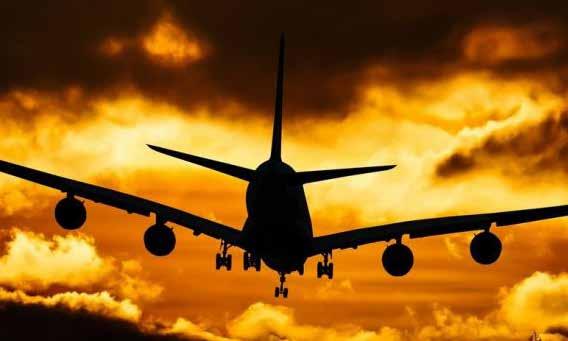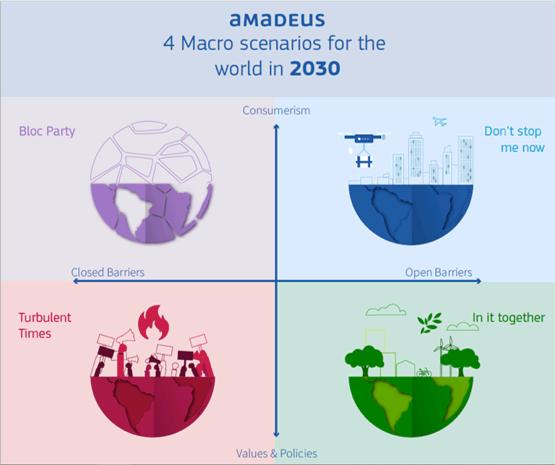
4 minute read
Preparing for the future, today
We can never know what tomorrow will look like, scenario planning offers a chance to explore the possibilities. We examine potential paths for the future and how they could impact travel.

Advertisement

While the acute phase of the pandemic appears to be passing in many regions, the path towards a healthier and growing global economy remains tentative. COVID-19 continues to create uncertainty across all industries, and travel is no exception. What is encouraging is that there are many positive signs of recovery, with global travel search data almost back at pre-pandemic levels, and with bookings steadily rising. However, this is no time for complacency, with the future shape of the sector still unclear.
It is therefore incumbent upon us, and other global organisations, to seek to understand the major drivers of change which are likely to shape the future. This is why already last year we commissioned scenario experts Stratforma, the experts in scenario planning and advisory consultancy, to work in partnership with us and explore different scenarios to help us understand how travel may evolve in the coming years.

The Scenario Planning methodology has been identified as one of the best approaches to address critical uncertainty around the future. However, while this type of work is vital to anticipate the emerging challenges and potential opportunities and to stress-test and re-evaluate our strategy, it is important to note this is not forecasting. We are not making predictions, but instead understanding the trends and drivers that are likely to shape the future.
Before we move on to the outcomes –a little about the process. During this exercise we hosted interviews with thought leaders, both from within and outside the travel industry, seeking expertise, views and unique perspectives on the future. This allowed us to identify more than 100 forces likely to impact travel in the coming decade. Following a process of selection, aggregation and evaluation, the 14 macro technological, economic, environmental and political (STEEP) pressures with the strongest impact on travel were identified. These included an increase in protectionism, disruptive natural events, the growth of the internet of things and the next wave of digital engagement, among others. Some of these we have some influence over while others we do not. With this information, future scenarios were codified along two axes of uncertainty: with drivers of demand ranging from increasing consumerism versus more values-based decisions along one, and a world which is less open versus more open along the other. These ‘critical uncertainties’ have shaped the main thrust of our analysis. In this context, consumerism is taken to mean a desire for consumption, personalised experiences, and gamification while a values-led mindset sees demand shaped by concerns, like sustainability, conscious consumption and political activism.
More open is taken to mean a commitment to global trade, freedom of movement of people, data, goods and capital, with porous borders and a commitment to a rules-based global order. Whereas less open is the antithesis, meaning a move toward nationalism, economic selfreliance, greater friction and stronger border controls.
Plotted on these axes, we can see the following four potential macroeconomic scenarios:
The most likely future will be a combination of these scenarios, drawing on elements of each. With dozens of forces pushing and pulling the world in different directions, no single trend or scenario is likely to dominate. We also cannot expect uniformity in terms of geography, with different outcomes expected across different continents. Nonetheless, as an industry we must be ready to respond to whichever scenarios we find ourselves confronted with.

With so much uncertainty – how will we prepare?
We believe that demand for travel will continue to grow, as the current data and evidence suggest. As restrictions have lifted, we have seen a rise in demand, demonstrating an appetite for travel that remains unwavering. However, we know change is constant, so what we see today may be very different from what we see in the longer-term. Why, where and for how long we travel is likely to shift.
With this in mind, we have identified four areas of focus we believe will benefit Amadeus, whatever tomorrow brings.
As the global centre of gravity of the world’s economy continues to shift, we will work to reinforce our business in Asia to access the growth potential of the region. We will continue to strengthen our footprint, working to develop local relationships and adjusting our portfolio to meet the specific needs of our partners.
And around the world, we will continue seeking to secure market access to increase our ability to operate in a range of geographies.
Technology will be the key enabler to help the industry recover and develop. We will work to integrate with the digital giants –a process we have embarked upon as we migrate our cloud services to Microsoft. As an industry, we will see the wider adoption of digital payments and biometric data, for example.
There is a growing demand – from consumers, travellers and governments – to make travel more sustainable. To facilitate this, we will work to enrich our IT solutions portfolio in fundamental areas, optimising our operations for key players and offering them enhanced technology to support the green transformation. Also, requirements from an increasingly less open world (‘blockism’) need to be taken into account in future planning.
Finally, Amadeus will continue work to develop our businesses to help our customers serve the end traveller. Including a greater focus on our ability to distribute leisure content, including experiences, while also targeting new leisure-oriented travel resellers, including lifestyle brands and super-apps. We will continue to have a traveller-centric model, making tangible improvements to each travel experience.
This is just the start of an ongoing journey. Even as we take the steps outlined above, the market continues to evolve, and we must be prepared. Amadeus will continue to assess the world around us, supporting our customers as their strategies evolve. However, one thing is constant: we will always focus on the traveller. Only by doing so can we renew travel and harness the growth opportunities for travel in the decade ahead.
This is the first in a series of blogs that Amadeus will be publishing around scenario planning.
Author: Amadeus








